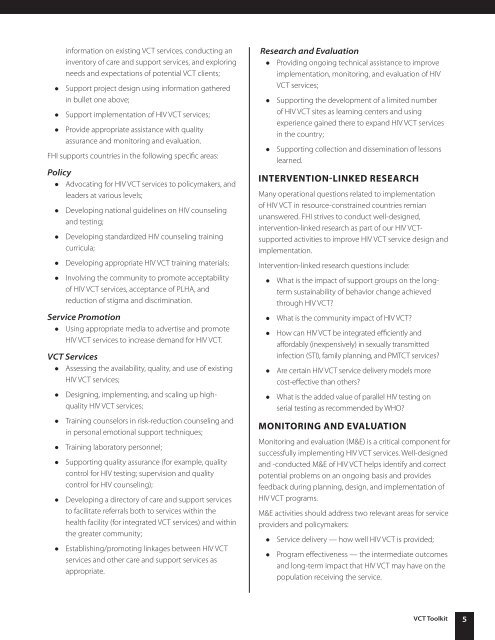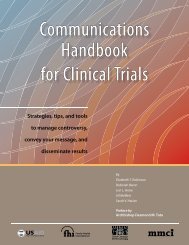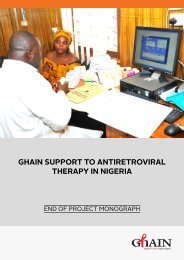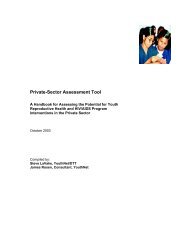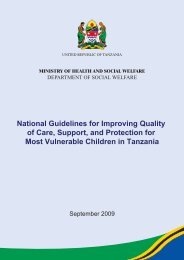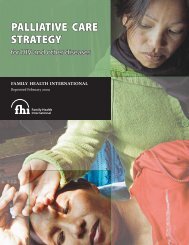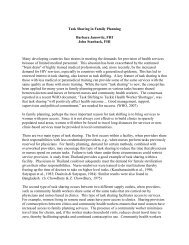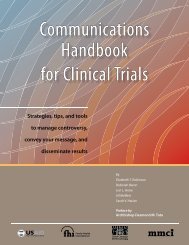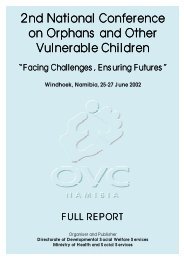Voluntary Counseling and Testing for HIV: A Strategic ... - FHI 360
Voluntary Counseling and Testing for HIV: A Strategic ... - FHI 360
Voluntary Counseling and Testing for HIV: A Strategic ... - FHI 360
You also want an ePaper? Increase the reach of your titles
YUMPU automatically turns print PDFs into web optimized ePapers that Google loves.
in<strong>for</strong>mation on existing VCT services, conducting an<br />
inventory of care <strong>and</strong> support services, <strong>and</strong> exploring<br />
needs <strong>and</strong> expectations of potential VCT clients;<br />
• Support project design using in<strong>for</strong>mation gathered<br />
in bullet one above;<br />
• Support implementation of <strong>HIV</strong> VCT services;<br />
• Provide appropriate assistance with quality<br />
assurance <strong>and</strong> monitoring <strong>and</strong> evaluation.<br />
<strong>FHI</strong> supports countries in the following specific areas:<br />
Policy<br />
• Advocating <strong>for</strong> <strong>HIV</strong> VCT services to policymakers, <strong>and</strong><br />
leaders at various levels;<br />
• Developing national guidelines on <strong>HIV</strong> counseling<br />
<strong>and</strong> testing;<br />
• Developing st<strong>and</strong>ardized <strong>HIV</strong> counseling training<br />
curricula;<br />
• Developing appropriate <strong>HIV</strong> VCT training materials;<br />
• Involving the community to promote acceptability<br />
of <strong>HIV</strong> VCT services, acceptance of PLHA, <strong>and</strong><br />
reduction of stigma <strong>and</strong> discrimination.<br />
Service Promotion<br />
• Using appropriate media to advertise <strong>and</strong> promote<br />
<strong>HIV</strong> VCT services to increase dem<strong>and</strong> <strong>for</strong> <strong>HIV</strong> VCT.<br />
VCT Services<br />
• Assessing the availability, quality, <strong>and</strong> use of existing<br />
<strong>HIV</strong> VCT services;<br />
• Designing, implementing, <strong>and</strong> scaling up highquality<br />
<strong>HIV</strong> VCT services;<br />
• Training counselors in risk-reduction counseling <strong>and</strong><br />
in personal emotional support techniques;<br />
• Training laboratory personnel;<br />
• Supporting quality assurance (<strong>for</strong> example, quality<br />
control <strong>for</strong> <strong>HIV</strong> testing; supervision <strong>and</strong> quality<br />
control <strong>for</strong> <strong>HIV</strong> counseling);<br />
• Developing a directory of care <strong>and</strong> support services<br />
to facilitate referrals both to services within the<br />
health facility (<strong>for</strong> integrated VCT services) <strong>and</strong> within<br />
the greater community;<br />
• Establishing/promoting linkages between <strong>HIV</strong> VCT<br />
services <strong>and</strong> other care <strong>and</strong> support services as<br />
appropriate.<br />
Research <strong>and</strong> Evaluation<br />
• Providing ongoing technical assistance to improve<br />
implementation, monitoring, <strong>and</strong> evaluation of <strong>HIV</strong><br />
VCT services;<br />
• Supporting the development of a limited number<br />
of <strong>HIV</strong> VCT sites as learning centers <strong>and</strong> using<br />
experience gained there to exp<strong>and</strong> <strong>HIV</strong> VCT services<br />
in the country;<br />
• Supporting collection <strong>and</strong> dissemination of lessons<br />
learned.<br />
INTERVENTION-LINKED RESEARCH<br />
Many operational questions related to implementation<br />
of <strong>HIV</strong> VCT in resource-constrained countries remian<br />
unanswered. <strong>FHI</strong> strives to conduct well-designed,<br />
intervention-linked research as part of our <strong>HIV</strong> VCTsupported<br />
activities to improve <strong>HIV</strong> VCT service design <strong>and</strong><br />
implementation.<br />
Intervention-linked research questions include:<br />
• What is the impact of support groups on the longterm<br />
sustainability of behavior change achieved<br />
through <strong>HIV</strong> VCT?<br />
• What is the community impact of <strong>HIV</strong> VCT?<br />
• How can <strong>HIV</strong> VCT be integrated efficiently <strong>and</strong><br />
af<strong>for</strong>dably (inexpensively) in sexually transmitted<br />
infection (STI), family planning, <strong>and</strong> PMTCT services?<br />
• Are certain <strong>HIV</strong> VCT service delivery models more<br />
cost-effective than others?<br />
• What is the added value of parallel <strong>HIV</strong> testing on<br />
serial testing as recommended by WHO?<br />
MONITORING AND EVALUATION<br />
Monitoring <strong>and</strong> evaluation (M&E) is a critical component <strong>for</strong><br />
successfully implementing <strong>HIV</strong> VCT services. Well-designed<br />
<strong>and</strong> -conducted M&E of <strong>HIV</strong> VCT helps identify <strong>and</strong> correct<br />
potential problems on an ongoing basis <strong>and</strong> provides<br />
feedback during planning, design, <strong>and</strong> implementation of<br />
<strong>HIV</strong> VCT programs.<br />
M&E activities should address two relevant areas <strong>for</strong> service<br />
providers <strong>and</strong> policymakers:<br />
• Service delivery — how well <strong>HIV</strong> VCT is provided;<br />
• Program effectiveness — the intermediate outcomes<br />
<strong>and</strong> long-term impact that <strong>HIV</strong> VCT may have on the<br />
population receiving the service.<br />
VCT Toolkit 5


